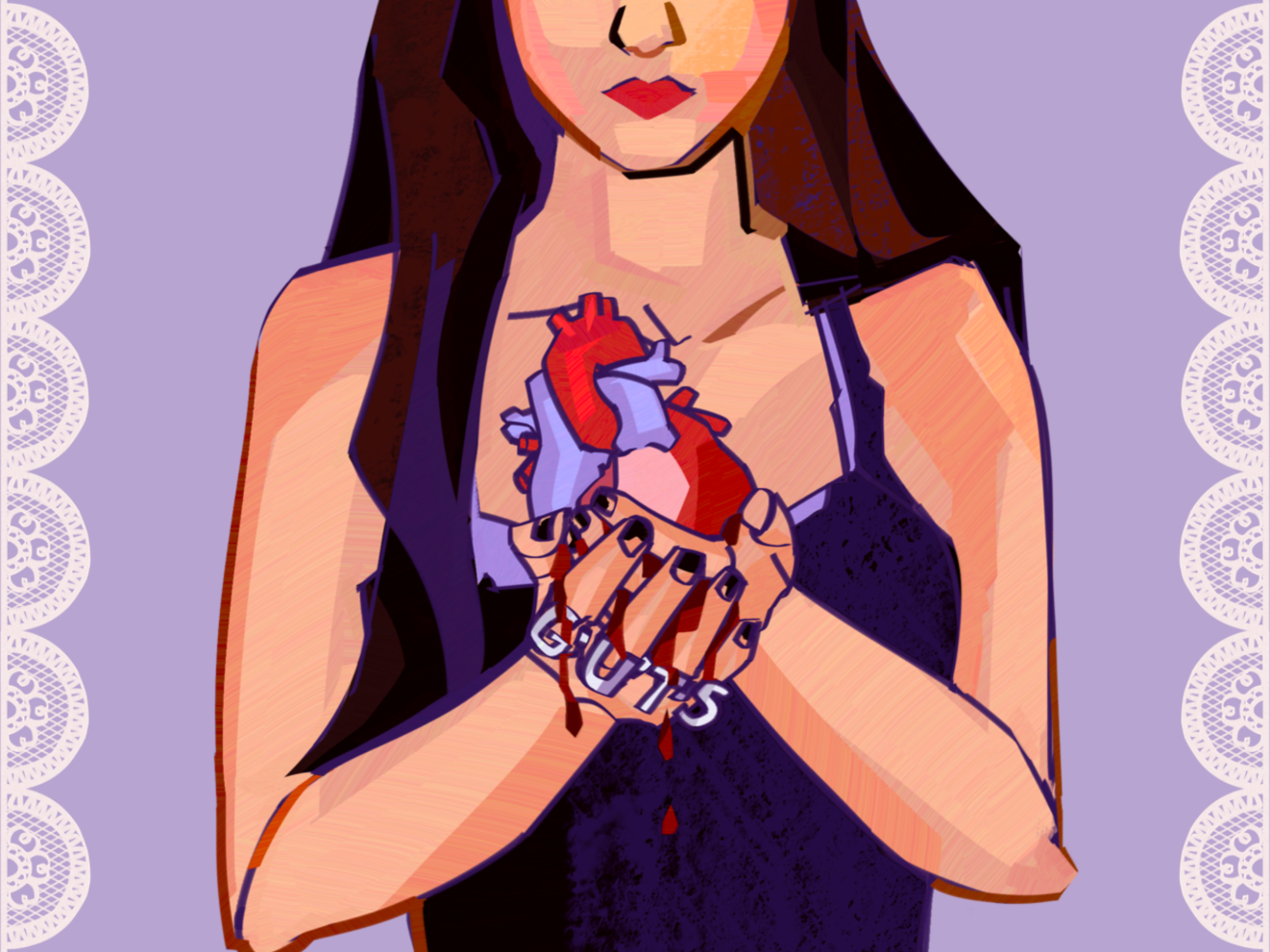Olivia Rodrigo has always worn her heart on her sleeve; now, she’s letting it bleed. On her sophomore album GUTS (2023), the 20-year-old pop superstar bares the ugliest, messiest parts of herself in a staggeringly sophisticated work of pop-punk perfection. Confronting manipulative ex-boyfriends, her self-destructive habits, and the unattainable expectations placed on young women, Rodrigo channels her anger into anthems for teens and 20-somethings who are still coming of age.
Rodrigo’s debut album SOUR (2021) mostly consisted of acoustic guitar ballads picking herself apart as she watched her ex move on while she grieved the breakup. Its unpolished sound made the record feel personal, but also unfinished. Most tracks did not employ a narrative arc or production skills nearly as complex as those on her debut single “drivers license.”
Now, Rodrigo allows herself to be even more vulnerable while flexing the lyrical and instrumental muscles that “drivers license” proved she had; even her vocals have evolved, with belts that sound fuller and whispers more harrowing. Each track on GUTS is compelling on its own, with razor-sharp writing and high production value, tied together into a cohesive project by thematic and sonic consistency. “I know my age, and I act like it,” she proclaims on opener “all-american bitch”—a testament to her emotional and musical maturity, but also to the youthful energy she maintains throughout the album. The contrast between sludgy guitars, relentless kick-drums, and a thrumming bassline on the chorus with the acoustic melody on the verses foreshadows Rodrigo’s turbulent emotions throughout the work.
Bookending the album with songs about the grueling transition from girlhood to adulthood affirms GUTS’s thematic throughline: the rage that comes with the impossibility of growing up as a woman. “I’m grateful all the fucking time,” she sings on the outro to “all-american bitch” in a piercing falsetto, mimicking the suffocating constraints of femininity. Similarly, album closer “teenage dream” is a sardonic play on the titular phrase: a girl’s teen years are mythologized with empty promises of carefree fun, but they’re really full of contradictions and oppressive expectations. “When am I gonna stop being a pretty young thing to guys?” is one of the questions she poses about her liminality between youth and adulthood. SOUR broached similar topics, with Rodrigo asking, “Where’s my fucking teenage dream?” on “brutal”; but entering her 20s, she knows better than to covet something nonexistent.
The disparity between Rodrigo’s desires and her lived experiences fuels her anger throughout the album. She grapples with this frustration on “pretty isn’t pretty,” whose upbeat tune and chugging electric guitars seem incongruous with lyrics detailing the beauty standards that make young women feel a constant need to improve their appearance. In this continuation of SOUR’s “jealousy, jealousy,” Rodrigo reassigns blame for her insecurities onto external factors instead of her own flaws.
Rodrigo could have easily absolved herself of responsibility for the disillusionment of her teen years; instead, she musters the courage to recognize her missteps. Perhaps the most moving track on the album, “making the bed” uses a down-tempo melody of soft electric guitars to give Rodrigo’s vocals center stage. She chronicles choices she’s made in an attempt to seem adult, but concedes, “I got the things I wanted, it’s just not what I imagined.” She continues by acknowledging her role in her unhappiness: “I’m playing the victim so well in my head / But it’s me who’s been making the bed.” Not only is this a bold confession to make on a chart-topping album, but it also speaks to Rodrigo’s attuned sense of self-awareness. This vulnerability allows her music to connect with other young women who’ve succumbed to pressure to act “grown-up.”
While Rodrigo’s capacity for heartrending ballads is perhaps unparalleled in contemporary pop, she’s also particularly adept at creating caustic, self-aware breakup bops. Her mournful depictions of loss—of both youth and of love—are balanced by angry reflections on her time with exes. “love is embarrassing” distills the dichotomous feelings of comfort and resentment in a toxic relationship that only become evident in retrospect. The blood-pumping percussive beat and guitar riffs make this the most fun listening experience on the album, as Rodrigo sneers at herself for what she tolerated: “Love’s fucking embarrassing, just watch as I crucify myself / For some weird second-string loser who’s not worth mentioning.”
These biting breakup songs encapsulate a deeply resonant feminine rage shouldered by women who’ve let a man infiltrate and excavate their hearts. Lead single “vampire” employs the metaphor of a bloodsucking monster who drained the life from a young woman—an image that’s been repeated time and again in pop culture—to represent her ex’s emotional manipulation. Starting with a soft piano melody, pit-stopping at mid-tempo with kick drums, and culminating with full percussion and guitars, the track consistently raises the stakes, and Rodrigo gives more and more of her vocals to keep up.
Later on the album, piano ballad “the grudge” articulates a similar source of resentment toward her ex with lyrics, “I hear your voice every time that I think I’m not enough.” Like “vampire,” this track uses the album’s visceral imagery in one of Rodrigo’s most poignant lines reaffirming the relationship’s power imbalance: “We both drew blood / but man, those cuts were never equal.” Her voice expands and cracks in just the right places to make each line a sucker punch. The piano motif that closes out the choruses is almost indistinguishable from the intro to “drivers license,” harkening back to when “the grudge” began. Invoking her earlier discography communicates the incessant pain of her unhealed wounds and epitomizes the songwriting brilliance that defines the album.
The concurrent evolution of Rodrigo’s lyricism and musicality coalesce in her breathtaking second act. She refines her pop-punk sound as uniquely her own while paying homage to her debut, returning to its subject matter with a matured perspective. Her willingness to reveal her insecurities, regrets, and deep-seated pain make one thing clear: Olivia Rodrigo has more GUTS than most 20-somethings.
VOICE’S CHOICES: love is embarrassing; making the bed; pretty isn’t pretty; the grudge





